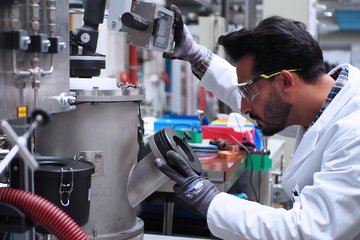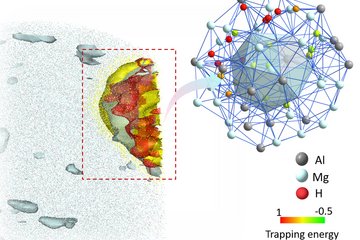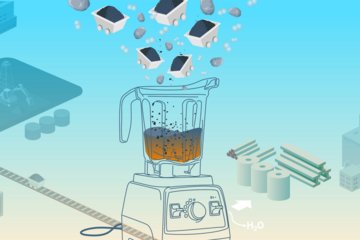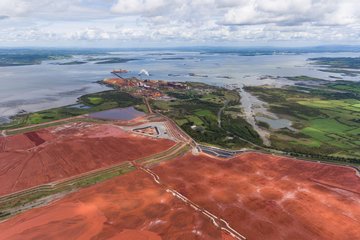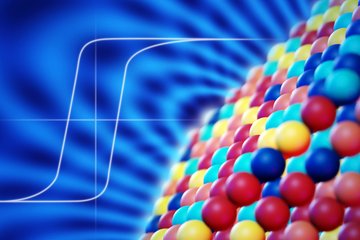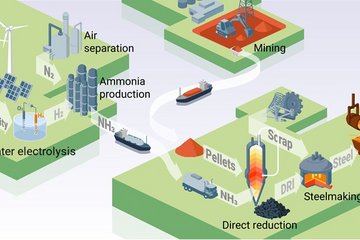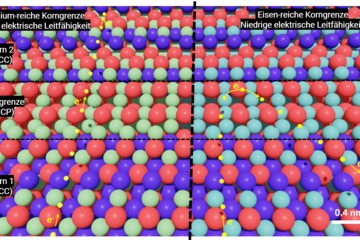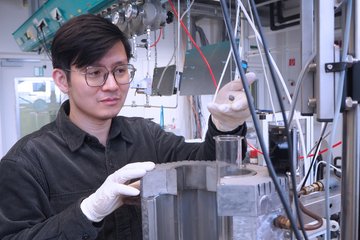Alle Typen
561.
Vortrag
Size effect in bi-crystalline Cu micropillars with a coherent twin boundary. Nanobrücken 2020: A Nanomechanical Testing Conference, Düseldorf, Germany (2020)
562.
Vortrag
Slip transmission in nanotwinned Ag under mechanical and thermomechanical loading. Nanobrücken 2020, Düsseldorf, Germany (2020)
563.
Vortrag
Interplay of chemistry and faceting at grain boundaries in a model Al-alloy. TMS Annual Meeting & Exhibition, San Diego, CA, USA (2020)
564.
Vortrag
Probing the mechanics of dislocation - grain boundary interactions: Lessons learned from in situ microcompression experiments. 14th International Conference on Local Mechanical Properties 2019 (plenary), Prague, Czech Republic (2019)
565.
Vortrag
Advances in automatic TEM based orientation mapping with precession electron diffraction. KSM Annual Fall Conference 2019, Gyeongju, South Korea (2019)
566.
Vortrag
How do grain boundaries transform on the atomic level? International Workshop on Advanced and In-situ Microscopies of Functional Nanomaterials and Devices, IAMNano 2019, Düsseldorf, Germany (2019)
567.
Vortrag
Micromechanics of Laves Phases: Strength, Fracture Toughness, and Hardness as Function of Composition and Crystal Structure. Joint EPRI-123 HiMAT Conference on Advances in High Temperature Materials, Nagasaki, Japan (2019)
568.
Vortrag
Development and applications of a high temperature nano-/micro mechanics device with a novel temperature measurement approach. Euromat 2019, Stockholm, Sweden (2019)
569.
Vortrag
Do we understand the microstructure and properties of materials: New insights by advanced microscopy techniques. Metallurgical Engineering and Materials Science Department, Indian Institute of Technology, Mumbai, India (2019)
570.
Vortrag
Atomic scale phase separation tendencies in nanostructured copper alloys. 26th International Symposium on Metastable, Amorphous and Nanostructured Materials 2019 (ISMANAM 2019), Chennai, India (2019)
571.
Vortrag
Experimental discovery of grain boundary phase transformations unveiled by atomistic simulations. Colloquium of IIT Gandhinagar, Palaj, India (2019)
572.
Vortrag
Resolving grain boundary phase transformations by advanced STEM for fcc metals and multinary alloys. 6th International Symposium on Metastable, Amorphous and Nanostructured Materials (ISMANAM-2019), Chennai, India (2019)
573.
Vortrag
Micro- and Nanomechanical Testing of Materials - From Materials Physics to Materials Design. Convegno Nazionale INSTM XII, Ischia Porto, Italy (2019)
574.
Vortrag
Microstructure and thermomechanical deformation of CrFeCoNi equiatomic CCA thin films. 26th International Symposium on Metastable, Amorphous and
Nanostructured Materials ISMANAM - 19, Chennai, India (2019)
575.
Vortrag
Experimental discovery of grain boundary phase transformations unveiled by atomistic simulations. PICS3 2019 Meeting, Centre Interdisciplinaire de Nanoscience de Marseille, Marseille, France (2019)
576.
Vortrag
Do we understand the interplay of microstructure and properties of materials: New insights by advanced microscopy techniques. MPI CPFS, Dresden, Germany (2019)
577.
Vortrag
High temperature mechanical characterization of binary Cu–X alloys produced by Combinatorial Synthesis. International conference on metallurgical coatings and thin films (ICMCTF) 2019, San Diego, CA, USA (2019)
578.
Vortrag
Advances in automatic TEM based orientation mapping with precession electron diffraction. Joint Max-Planck-Institut für Eisenforschung MPIE) / Ernst Ruska-Centre (ER-C) Workshop, Düsseldorf, Germany (2019)
579.
Vortrag
Hydrogen-metal interactions by in-situ and ex-situ nanoindentation. 2nd LINCET Symposium, Downing College, Cambridge, UK (2019)
580.
Vortrag
Slip transmission across multiple coherent twin boundaries in nanotwinned Ag. Seminar on "Slip Transmission in nanotwinned Ag", Indian Institute of Science, Department of Materials Engineering, Bangalore, India (2019)

